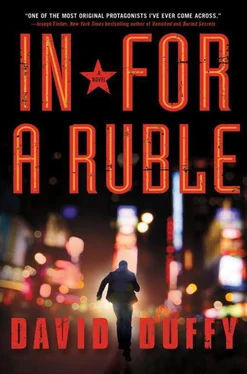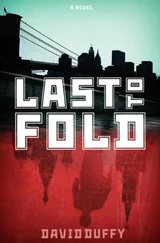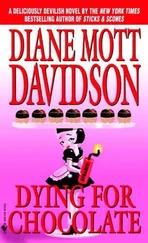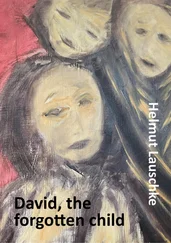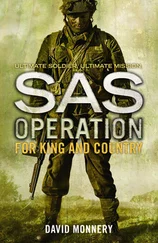“Yikes,” she said when she saw my bruises. “I didn’t notice those last night. You look worse than last summer. What happened this time?”
“Someone wanted to send a message, and he selected me as the messenger. They look worse than they feel—now.”
“You go looking for trouble or does it just find you?”
“I wasn’t looking to get beat up.”
“But I’ll bet you did something that attracted the beater’s attention.”
“Indirectly.”
“See what I mean? What was it this time?”
“It’s Foos’s fault. He asked me to help out a friend.” I reached for her towel, but she slapped away my hand.
“And the friend beat you up?”
“Nosferatu beat me up. He’s a six-foot-seven Belarusian with buckteeth, named after a German vampire. The friend tried to crush my legs under his granite conference table.”
“You’re teasing me, and you’d better stop.” Her temper was still in place—the Bayou twang, I’d learned, was its early warning system. I held up my hands, palms facing her.
“All true. I swear.”
“Christ. You need someone to take care of you.”
“I’m taking applications.” I made another try for the towel. She slapped me away, with a smile.
“Breakfast, remember?”
“There are all kinds of hunger.”
I pulled at the towel once more. This time she let it fall away as she came into my arms. She was damp and warm all over and hot and wet where it counted. She gave a little cry and sank teeth into my shoulder as I lifted her behind and planted her against the wall to find my way inside. The cry melted to moan.
“Make me one promise,” she said.
Uh-oh. “I won’t lie to you again,” I said.
“You don’t have to lie. Just tell me you won’t let me leave, like you did last time.”
I laughed and said, “That’s the easiest promise I can make.”
“You’ve got me right where you want me—in every possible way. Take me like you mean it.”
* * *
We ate a long, large, leisurely meal, desire sated for the moment, each of us unsure how to start the conversation we both wanted to have. The departure—breakup—six months before had been abrupt. She’d walked out of my apartment, willing me to do something, anything to try to stop her—and I hadn’t moved a muscle. I’d wanted to, I’d been desperate, every part of my body was trying. I do learn from my mistakes. Some wise person once said you get to make three or four big decisions in life—try to get more than half of them right. I’d fucked up my first couple, paid the price for decades, and was still digging myself out of that hole with Aleksei. So as much as I’d wanted to stop her, I’d let her walk. To do otherwise was to send my son to his execution.
Now we were back at the very same kitchen counter, each of us wanting to explain our actions, tell the other how we felt, why we did what we did. We both knew there was no question of incrimination—bygones were already bygones. Forgiveness, to the extent any was necessary, had been granted in an instant last night. The need to explain is one of the most basic human desires. We all want to be loved—we also need to be understood. So the question at the moment, as we chewed bacon, scrambled eggs (with Tabasco), and English muffins, was how to get started.
I said, “Where did you go?”
“Several places. Home to Louisiana. Not much left there for me now, since my mom died. Then my sister in Miami. She’s got breast cancer. Double mastectomy. That’ll give you some perspective.”
“How is she?”
“They think they got it all. She’s doing okay, except her husband, who’s some kind of oceanic consultant, ran off with a hot Cuban babe from his firm. Apparently she’s something in a wet suit. Seems he’s been banging her for the last year, including the whole time my sister’s been sick. Men can be real bastards.”
I didn’t disagree. There was no point. Besides, she was right.
“Once Louisa went back to work, I went out to West Texas. Town called Marathon. Spent the last month there, thinking things over. I wanted solitude, and it’s pretty damned lonely.”
“Beautiful, though,” I said. “Gage Hotel?”
“Goddammit! How in the hell do you know everything I do? He told you, didn’t he? He and that computer serpent-thing…”
“Nobody told me anything. The Gage is the only hotel in Marathon. About the only thing in Marathon, period. You can cut the atmosphere with a knife. Great restaurant.”
“ You’ve been there? ”
“Uh-huh.”
“Shit. Momma taught me lots of things. But she never said, ‘Don’t date a spy.’”
I told her the story of trying to outrun the Basilisk. I’d spent a week at the Gage, where they put a package of earplugs by your bed, as if they’re going to be any help against the mile-long freight trains that rumble through town at 3:00 A.M.—fifty yards from your room.
We traded notes about West Texas. Solitude and loneliness don’t begin to describe it. Neither do awe-inspiring or beauty. Her favorite spot was the McDonald Observatory outside Fort Davis, where from an altitude of almost seven thousand feet, you can see the stars and planets through high-powered telescopes with virtually no interference from ambient light on the ground. Mine is Donald Judd’s Mecca of minimalist art in Marfa, which he built on an old army base he’d bought from the government—where he’d been stationed as a teenager. Not unlike Muhammad’s epicenter, visiting requires a pilgrimage—the closest airport is El Paso, three and a half hours away. In a way I think Judd understood, it makes getting there half the fun.
Victoria had visited Chinati, as Judd called his desert creation, and not to my surprise, didn’t think much of it. “Art my ass. Concrete rectangles. Steel boxes. Neon lights. That’s not art.”
Minimalism is like my shaved head, people like it or they don’t. Victoria was forcefully in the latter camp on the art question. There’d be time enough to argue that later.
“I listened to a lot of Tom Russell while I was out there.”
“ Now you’re talking. Bet he doesn’t have any more use for those antelope shacks than I do.”
Antelope shacks are what the locals, most of whom agree with Victoria, call the concrete structures Judd placed in a field alongside Route 67.
“What did you do, while I was away?” she said.
“Nothing much. Series of one-night stands.”
“What?! You son of a…!”
The right hand came flying across the counter. I resolved to take my punishment like a man and waited for the sting of the slap. She stopped before she got there.
“You really are a bastard.”
“Sorry. Couldn’t resist. Hard for a virile Russian male in the prime of virile Russian maleness to admit he’s been rendered feeble and helpless by a capitalist vixen.”
“Spare the socialist horseshit. Did you miss me?”
“I spent most of the time moping, you want to know the truth. Didn’t do much of anything. Foos can confirm that. He wouldn’t let me use the Basilisk to find you, which made it worse because I knew how easy it would be. I drank too much. That just made me think more about you. Tried to break out of it by going to Moscow. Saw Aleksei. First time I’ve spent with him since he was a baby.”
“How’d that go?”
“Not great, about as well as can be expected, I suppose. Not easy, starting again after almost thirty years. Worse than starting from scratch, really, because there’s the baggage. Why’d I leave? Why didn’t I let him know where I was? Why did I lie to his mother? Underlying all those questions, of course, is the unspoken premise—why were you only thinking of yourself? And why should I believe you’re any different now? Then there’s my career with the Cheka, not to mention the family connections, which are a huge issue for him. He’s borderline irrational on the subject, not that I blame him. Hard to get past how much damage we did—and the number of people we did it to. Also hard to explain when it all happened in another time, another place, another world really.”
Читать дальше
